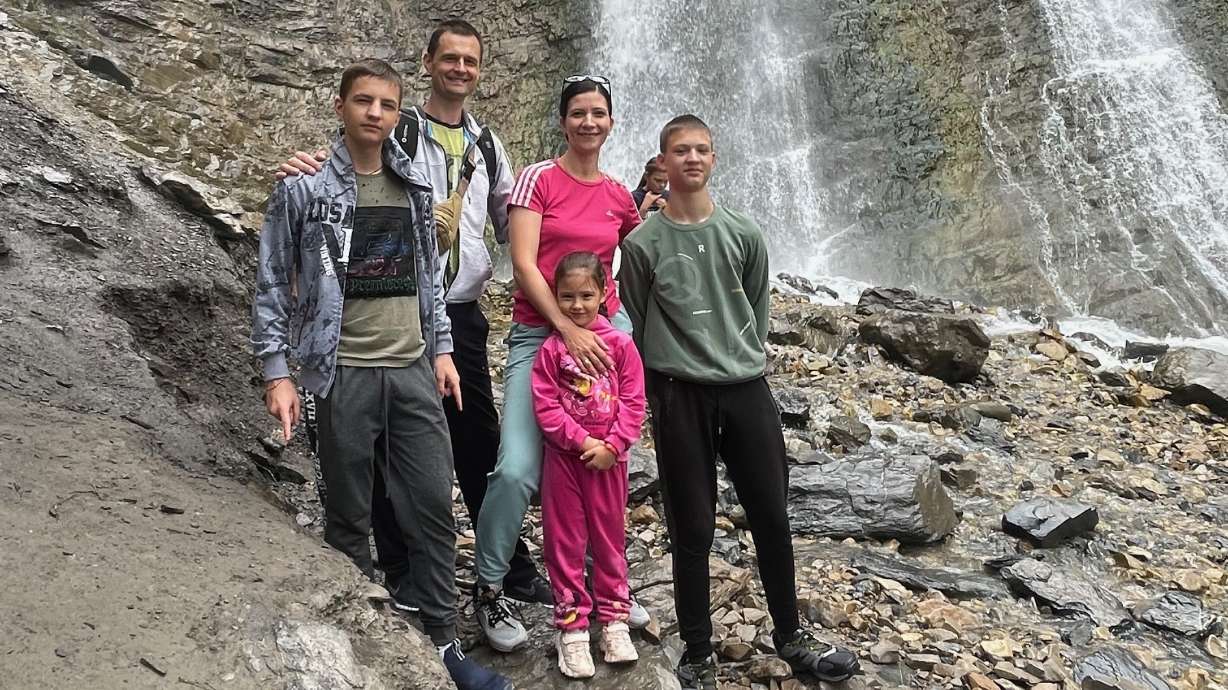- Like other groups, Ukrainian immigrants in Utah face an uncertain future as President Donald Trump takes aim at immigration.
- The Uniting for Ukraine initiative's pause is leaving many Ukrainian families in legal limbo and prompting their U.S. sponsors to speak out.
- One possibly remedy would be passage of the Ukrainian Adjustment Act, advocates say.
LINDON — Latino immigrants in Utah under immigration initiatives launched by President Joe Biden aren't alone in feeling uncertain about their future in the United States.
Ukrainian immigrants in Utah and their advocates say refugees from the European nation are also worried about their future as the Trump administration slows down immigration and presses for removal of immigrants in the country.
Notably, President Donald Trump issued an executive order on beginning his second term in January that halts, at least for now, the Uniting for Ukraine initiative, which created a means for Ukrainians fleeing the war with Russia to come to the United States. Another initiative that grants certain Ukrainians temporary protected status in the country also faces a shaky future.
The Ukrainian community in Utah and across the United States is "nervous, really nervous," said Valentyna Ahieieva, who came to Utah with her husband and three children in August 2023 from the Odessa region of Ukraine, sponsored and supported by a contingent of Lindon residents. With the Uniting for Ukraine program paused, the Ahieieva family can't extend their lawful status, set to expire this coming August, putting their future in limbo — a situation faced by many.
Changes implemented under Trump have "shut down further immigration and made it clear to those that are here that they're not welcome, and they should plan on leaving," said Jared Oates, one of several sponsors and backers the Ahieieva family has in Lindon. "It seems to be just a general predisposition to shut down immigration."
The Uniting for Ukraine initiative came into existence under Biden, and other immigration initiatives launched under Trump's predecessor likewise face elimination, including a humanitarian parole program geared to Cubans, Haitians, Nicaraguans and Venezuelans.
Mindie Packer, also assisting other Ukrainians in Utah with her husband Win Packer, knows of one Ukrainian family that left the United States for Spain, where they have family, because their lawful status ran out. The Packers, who run Hope Across Borders, a Utah nonprofit group that has sent aid to Ukraine, worry about more such cases in the coming weeks and months.
"They're going to become homeless welfare cases, and we're doing that to them," said Win Packer. According to the Utah Department of Workforce Services' refugee services office, around 1,000 Ukrainians drawn by the Uniting for Ukraine program live in the state.
Ahieieva and Oates seek passage of an initiative that would give Ukrainians already in the country a means to lawfully remain, the Ukrainian Adjustment Act. Oates said some of the Ahieieva family's advocates met with Rep. Mike Kennedy, a Republican who represents Utah's 3rd District. Kennedy seemed sympathetic, but still, Oates worries.
"My understanding is that it's just in limbo. It's still out there as a proposal, but the political climate is not such that it is going to get any traction unless there is significant pressure from constituencies," Oates said.
Numerous Lindon residents have been helping the Ahieieva family settle in the city and adjust to life here.
Immigration attorneys who Mindie Packer has consulted have said Ukrainians facing an expiration to their lawful status here could seek asylum, which might at least create a means for them to remain as their cases are considered. Otherwise, when their status runs out, said Win Packer, many might have to hide in the shadows, unable even to return to Ukraine because their homes and communities have been destroyed by Russian forces.
Since coming to the United States, Ahieieva said she and her husband, bookkeepers in Ukraine, have launched a bookkeeping and tax preparation service in American Fork. They want to keep it going and, significantly, keep their three kids, ages 16, 15 and 4, in a safe environment. They're quickly adjusting to life here.
"We don't want to return back because the attacks are still going on," she said. "It's really scary to return back. We're scared for our kids' lives and our lives."









